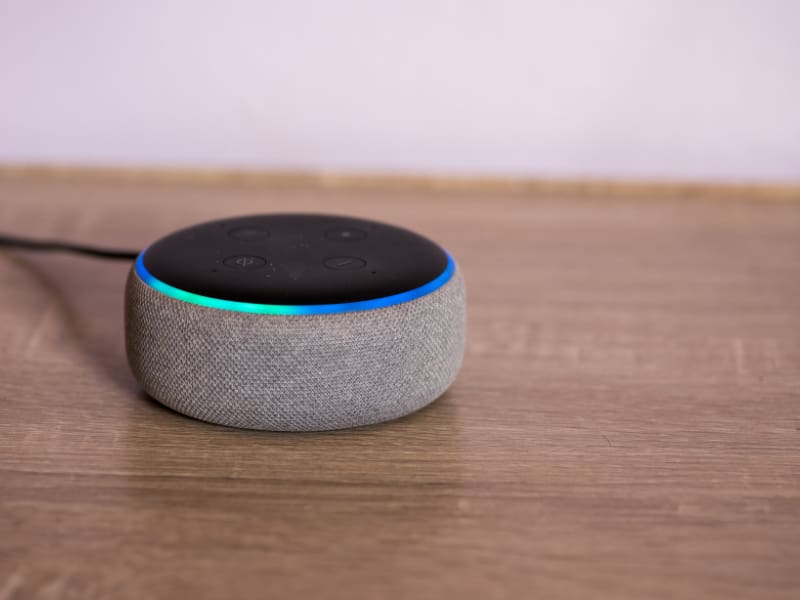Most companies haven't yet fully utilised the potential of mobile searches. According to Google, nearly 50% of all mobile searches are now done through voice commands.
Market penetration of voice assistants and smart speakers such as Apple's Siri, Android's Google voice search, Microsoft's Cortana, Google Home and Amazon's Alexa continues.
According to Search Engine Watch, local keyword related queries are three times more likely than their text-based equivalents. BrightLocal reports that 58 percent of customers use voice search for "near me" queries.
If you want to increase your traffic, then it makes perfect sense to optimise your website for mobile searches.
Here's our guide for optimising your website for use by people who use voice search. It ensures that your website performs well when people use speech recognition software to look up information instead of typing out their searches.
Start With Mobile First Design
Mobile devices are now the primary means by which people access the internet. Therefore, it is important for developers to focus their efforts on making websites responsive to these new technologies.
Make sure your website is easy to use for everyone.
Responsive design ensures that your web pages show up well on different devices, including smartphones, tablet computers, laptops, TVs, and smart watches. It also ensures that they show up quickly and look good on smaller screens.

Make sure your web pages are optimised for voice searches
If you want to optimise your website for people who use voice assistants and smart speakers, write text that’s easy for them to read aloud.
Before beginning, you'll need to decide which types of contents are best for answering voice searches. Here are some key elements to consider when writing voice search-friendly content and articles:
- Don't use long paragraphs of text; instead, use shorter paragraphs.
- Include key phrases within the first 100 words.
- Write naturally. Do not force yourself into unnatural ways to think when trying to compose text.
- Avoid using jargon and technical words when reading aloud. They may be confusing for someone hearing them read aloud.
- Include pictures and videos. They clarify ideas and add interest to your writing.
Use Keywords Appropriately
Keyword analysis is one of the most important parts of any SEO strategy. Ensure that your pages contain your target keywords so that they appear at or near the top of the search engine result page when someone uses a search command.
Keywords are words or phrase that help searchers locate your web pages.
Look for keywords that relate to your products or services. Avoid using overly general terms like “heath care” or “finance”.
Instead, look for specific phrases that match the kind of business you run. For example, if you own a medical equipment repair shop, try searching for terms like "medical devices," "medical supplies," "medical equipment," etc.
If you run a restaurant, you might want to create content like “Top Five Restaurants near Me” or “The Best Places to eat in the area.”
If you're looking for shoes, you may want to include "shoes" as one of your keywords.
Put key words into titles so they appear when people google for them.
Keyword optimisation is an important part of making sure your site ranks for voice search. Using keyword phrases in your page titles is one way to increase traffic to your pages.

Include Keywords in Headlines
Keywords can help improve your website’s visibility in search engines. They also make it easier for users to find what they're looking for. However, if you try to stuff them into every conceivable place, you'll end up with keyword spamming, which may get your site banned from Google and other search engines. Instead, write naturally without stuffing keywords wherever possible.
Test Different Keywords
When testing different variants of your main keyword phrase, try out synonym words too. You may find that some variants of your main keyword phrases don't perform well at all.
Use Long-Tail Keywords
Keyword research involves searching for phrases rather than single words. These phrases are often longer and therefore more specific, which means they’re often more effective at driving qualified visitors to your site.
Use schema markup to your pages
Structured Mark Up allows you to include structured content about your web page within the HTML code itself. This makes sure Google knows exactly what each piece of content means.
It helps websites to be found by Google and other major web crawlers more easily.
Create Rich Snippets
Adding rich snippets to your site allows you to add additional details about your page's contents. These include things such as phone number, address, review, and price.

Content for Voice Search Optimisation
You should add audio and/or videos to your web pages if they're relevant to your business. However, these additional features need to be relevant to your business; for instance, a podcast isn't always appropriate because most are informational rather than entertaining.
Audio Content
Audio contents are another effective way to increase visitors' engagements and improve searcher ranking. If a user types a keyword phrase into their smartphone, they expect to be able to receive the answer they're looking for. Adding audio to your web pages increases the likelihood that they'll receive the answers they need.
For example, if you're trying to sell shoes, you could include an audio file where people ask questions like:
- What size shoe would you suggest?
- Is this style comfortable?
Adding audio elements may also include adding music, podcast, audiobooks, and sound effects.
Audio can also be used to explain complex concepts. A digital transcription makes it easy for people to hear exactly what the webpage says so they can easily comprehend it.
Image Content
Optimise images for web page load time. They're critical to ensure that users find what they're looking for quickly.
If you're using multiple images for each colour of the background, you can combine them into one large file.
Optimisation for mobile devices is very similar to optimisation for desktop computers. Both require keeping paragraphs short and breaking long ones into smaller ones. In addition, you can use alt tag images to help them appear better when searched for.
You may also wish to include alternative tags for people using assistive technology. These allow blind people to access content they cannot otherwise see.
Don't include too much content within an image.
Video Content
To get found by voice search (and thus, increase traffic), you must first produce video content. A study conducted by Google shows that if you're producing videos, they'll be rated higher than texts for most queries. However, there is an exception—when searching for travel-oriented questions.
Videos are especially helpful when they provide information about products or demonstrate how to use them. For example, you might include videos demonstrating how to use a new phone or explaining how to set up an online shopping cart.
Tutorial videos are especially helpful for newbies who want to jump into video marketing immediately, and they encourage interaction between your audience and your brand by encouraging them to pose questions.

Make sure there is a strong call to action
Voice searching often returns results from multiple sources. An interactive button gives voice searchers an easy way to navigate back to the source where they made their voice query before completing their task. Additionally, it helps provide additional context for voice searchers.
Your website should have a single primary purpose. Whether that’ s to sell something, provide useful content, entertain visitors, or whatever else. A clear call to action (CTA), like “Buy Now!,” makes sure visitors know where they need to go next.
Make sure to include video calls to action
Videos are an effective way to get viewers to click on links within videos.
Make sure your content includes relevant internal linking.
A third reason why providing relevant content on websites is so important is because when visitors come to your site, they want to see if there's anything interesting on your site. If your web pages contain useful content, then visitors will be inclined to spend more time on your site than otherwise.

Build trust
To help ensure that people get the best results when they use Google, Google wants to show only trustworthy websites in their results.
Be Consistent
It's important to monitor your site's traffic and conversion rates consistently over time so you can identify trends.
Test and Learn
Testing and experimentation are essential for SEO. Voice searches are just like any other type of search.
Integrate Social Media
You can use social networks like Facebook and Twitter to see what people are talking about and which words they’re choosing to describe things.
Promote Your Site
Sharing your posts on social media sites like Facebook, Twitter, Instagram, and Pinterest can be a good way to increase your website's traffic.





